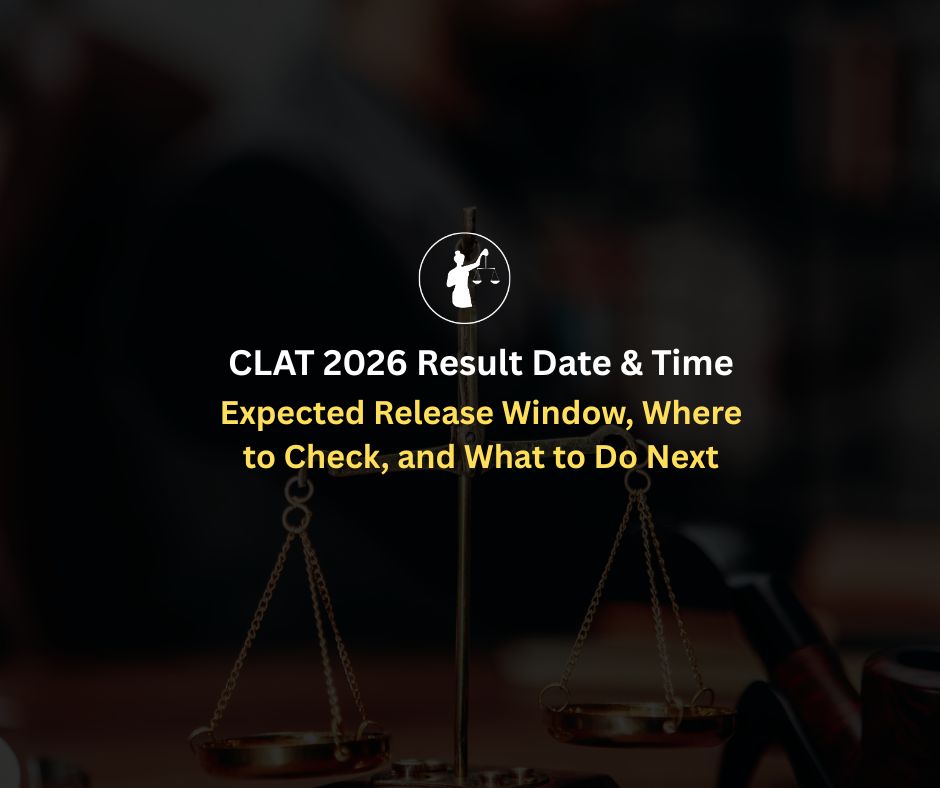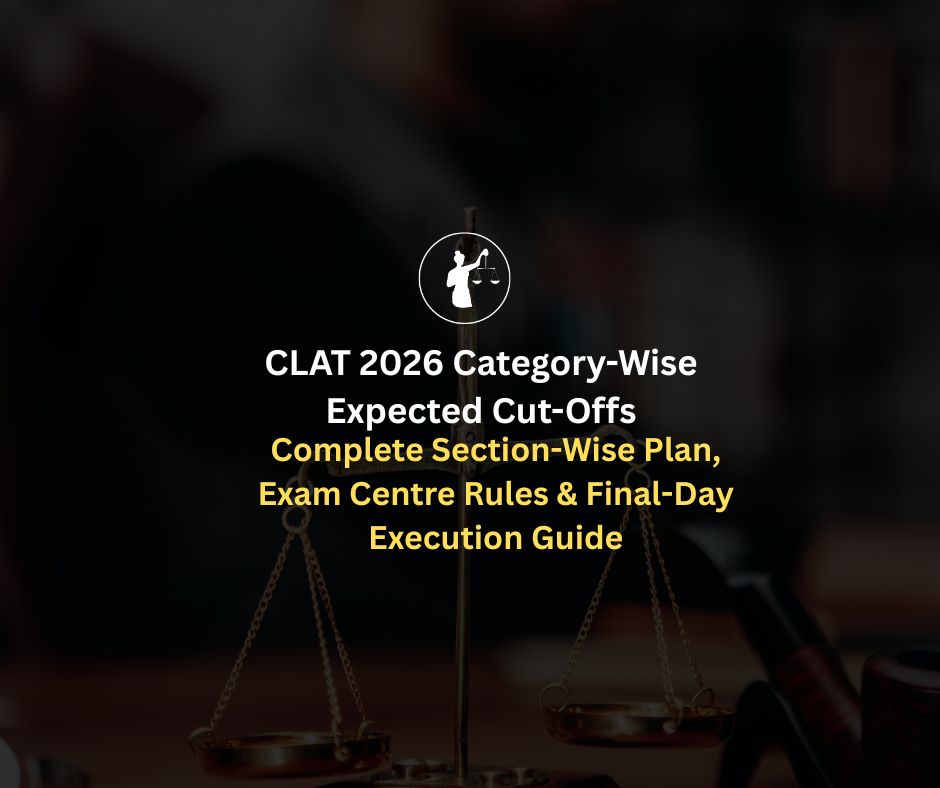
Every year, thousands of students step into CLAT prep with one goal: cracking that elusive Top 3 NLU dream. But the deeper you go, the more you realize this isn’t just an exam. It’s a psychological marathon.
With CLAT 2026 on the horizon, the stakes are higher, the competition sharper, and the margin for error almost non-existent. So the real question isn’t just "How tough will it be?" but "How do I outsmart it?"
Also Read: Offline Mocks vs Online Mocks for CLAT 2026
Dropper Surge: Every year post-CUET, more serious aspirants drop mainstream options and commit fully to law. This pool is not just bigger it's smarter.
Improved Resources: The rise of mentorship-led communities, offline mock ecosystems, and niche prep material means the average prep quality has gone up. So just doing the basics isn’t enough anymore.
Tier-3 to Tier-1 Jumpers: Many first-year students in mid-tier NLUs will quietly reappear for CLAT 2026. These candidates have already tasted the exam once and know exactly where they went wrong. They’re efficient and dangerous.
Mock Culture > Bookworms: Students who rely on mocks, strategy, and exam psychology now outperform those stuck in passive content consumption. This is a shift. CLAT rewards performance under pressure, not just knowledge.
Let’s break down the real levers that’ll separate the top 500 from the rest:
1. Shift From Content Hoarding to Pattern Recognition
If you’re downloading more resources than you’re actually studying, you’re not preparing you’re distracting yourself. Every untouched PDF is a mental burden, not an asset.
CLAT rewards your ability to decode patterns in RC logic, in how options are framed, in how static GK hides inside current events. Start looking at past papers like a detective, not a student. Ask:
What type of wrong options do I fall for?
Why did I eliminate the correct answer?
What distractor types do I keep ignoring?
This is how top scorers refine accuracy.
2. Create a 7-Day Tactical Loop
CLAT isn’t about a single good day; it’s about consistency. The best candidates don’t study more, they repeat smarter.
Monday–Tuesday: Solve 1 mock + analyze it for 2 hours over 2 days.
Wednesday: Skill drills – RC/CR/QA for 90 minutes each.
Thursday: Solve previous year questions by section.
Friday: Journal your top 5 mistakes of the week and why they happened.
Saturday: Doubt-clearing + CLAT pattern analysis (not current affairs alone).
Sunday: Revise every mock mistake from the last month.
This loop builds momentum that doesn’t break.
Also Read: Is CLAT 2026 Going to Be Tougher?
3. Get Ruthless About RC & LR
These two sections make or break your score. Most students casually say "I’m bad at RC" as if that’s permanent. It's not.
Fixes that actually work:
Read 2 editorials daily — but pause after each paragraph and predict what should come next. That builds anticipatory reading.
Practice eliminating 3 options per question, not finding 1 right one. That’s the CLAT mindset.
Start tracking your accuracy per RC type: legal, philosophy, science, politics. Know your weak genres.
LR is logic + reading. If your accuracy dips, it’s either attention fatigue or flawed elimination. Learn to pause before you panic.
4. Find a Mentor Who Understands the Psychology of Mistakes
Most mentors give topic-wise plans. Few ask: Why are you getting distracted at 40 mins into mocks? Why are you second-guessing in RC?
Find someone who:
Tracks your mock graph weekly.
Points out why you’re stuck at 70 — not just says "do more mocks".
Can explain the mental design behind CLAT options.
A real mentor won’t just tell you what to study. They'll change how you think during the paper.
5. Build a Personal Tracker That Measures Behavior, Not Just Scores
Keep a private Google Sheet or Notion table tracking:
RC accuracy % by genre
% of mocks where you improved timing
Most repeated error types
Time of day when you perform best
Number of careless errors per week
This isn’t an obsession. It’s feedback. And feedback is how you stop repeating 60–70 forever.
6. Create a Reset System for Burnout
CLAT prep is a grind. The toppers aren’t always studying — they’re just better at bouncing back.
Every 10 days, take a ‘Reset Day’:
Don’t open Telegram or mocks.
Watch a good interview of a CLAT topper.
Reflect on your progress journal. Ask: What do I now know that I didn’t last month?
Plan only 3 priorities for the coming week.
These resets prevent burnout while keeping your edge sharp.
CLAT 2026 isn’t just about how much you study; it’s about how strategically you prepare amid fierce competition of over 1 lakh aspirants competing for roughly 3,000 NLU seats. The key isn’t endless effort but smart effort: understanding the exam’s psychological traps, building consistent study cycles, and tracking your own behavior to spot hidden weaknesses.
NLTI mentors specialize in this high-level approach, breaking down your prep habits, decoding mock test data, and helping you build mental resilience and tactical clarity. When you shift from mindless practice to mindful preparation, you don’t just keep up with competition, you beat it.
Remember, the toughest exams don’t reward those who work harder but those who work smarter, every single day.
Join Our Telegram for Latest Updates
Frequently Asked Questions on CLAT 2026 Competition & Preparation
1. Will CLAT 2026 be tougher than 2025?
Likely yes — due to a rising number of droppers, better prep resources, and increased awareness.
2. What is a good score in mocks during June 2025?
A consistent 70+ with improvement trends in RC and LR is a strong position.
3. Is it possible to jump from 60 to 95+ by November?
Yes, if you fix mock analysis, reading habits, and stop passive prep.
4. Do board students stand a chance against droppers?
Absolutely, if they follow a tight routine and avoid content overload.
5. Should I attempt 100% of the CLAT paper?
Only if your accuracy consistently supports it. Attempting 80–90% with high precision is often better.
6. How many mocks are enough before CLAT?
At least 50, but the real game is in reviewing them deeply.
7. I’m weak at Maths can I still crack Top 5 NLUs?
Yes, if you get 5–6 reliable questions right and master RC/LR/GK.
8. Are offline centers still useful in 2025?
Yes, especially for mock environment and real-time doubt resolution.
9. Is it too late to start CLAT prep in June 2025?
No if you go all in with smart strategy and tight mentorship.
10. Should I read newspapers daily?
Optional. Focus instead on structured GK capsules and targeted editorials.





